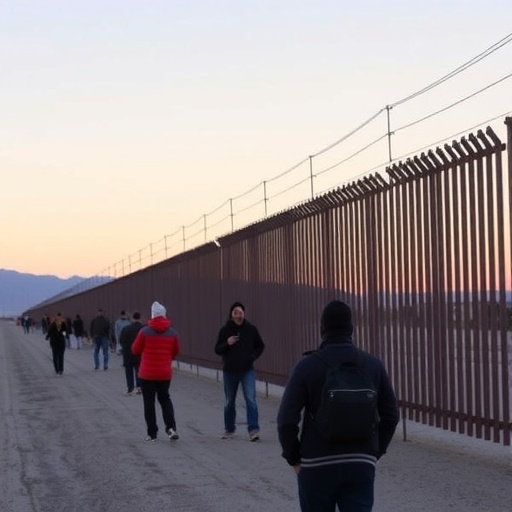Senate Debates Sweeping Immigration Reform Bill as Border Crossings Surge to New Highs
In a heated session that stretched into the early hours, the U.S. Senate yesterday dove into contentious debates over a comprehensive immigration reform bill, S. 1247, amid reports of record-breaking border crossings exceeding 250,000 encounters in a single month. This surge has amplified calls for stronger border security measures, while progressive lawmakers push for expanded pathways to citizenship for millions of undocumented immigrants. The bill, introduced by a bipartisan group led by Senators Lindsey Graham (R-SC) and Dick Durbin (D-IL), represents the most ambitious attempt at immigration reform in over a decade, but divisions threaten to derail its progress.
- Lawmakers Clash Over Fortifying Border Security with New Technology and Personnel
- Pathways to Citizenship Ignite Passionate Arguments on Family Unity and Economic Contributions
- Economic Stakes High: How Immigration Reform Could Reshape Labor Markets and Fiscal Policy
- Border Voices Amplify Urgency: Personal Stories Driving Senate Momentum
- Bipartisan Breakthroughs on Horizon or More Gridlock? Charting the Path Forward
The debate kicked off with stark statistics from U.S. Customs and Border Protection (CBP), revealing that fiscal year 2023 saw more than 2.4 million migrant encounters at the southern border—a 50% increase from the previous year. “This isn’t just numbers; it’s a humanitarian and security crisis unfolding daily,” declared Senate Majority Leader Chuck Schumer (D-NY) during opening remarks, underscoring the urgency that has gripped Capitol Hill.
As lawmakers from both sides of the aisle trade barbs, the fate of the Senate‘s immigration reform efforts hangs in the balance, with potential implications for national security, the economy, and the lives of families caught in the crossfire.
Lawmakers Clash Over Fortifying Border Security with New Technology and Personnel
The core of the Senate debate revolves around bolstering border security, a flashpoint that has pitted Republican hardliners against Democrats seeking a balanced approach. Proponents of the bill argue that investing $20 billion in advanced surveillance technology, including AI-driven drones and biometric scanners, could reduce illegal crossings by up to 40%, according to a recent report from the Department of Homeland Security (DHS).
Senator Ted Cruz (R-TX), a vocal advocate for stringent measures, took the floor to lambast what he called “porous borders under the current administration.” “We’ve seen fentanyl pour in like a flood, killing over 100,000 Americans last year alone,” Cruz stated, citing CBP data linking border apprehensions to drug trafficking. He proposed amendments to the bill that would mandate the completion of 700 miles of border wall within two years, a provision that drew sharp rebukes from Democrats.
On the other side, Senator Alex Padilla (D-CA), who chairs the Senate Judiciary Committee’s immigration subcommittee, emphasized that walls alone are insufficient. “True border security means smart investments in personnel—adding 5,000 more Border Patrol agents and modernizing ports of entry,” Padilla argued. He referenced a Government Accountability Office (GAO) study showing that understaffed facilities have led to processing backlogs exceeding 1 million cases, exacerbating humanitarian concerns.
The clash extended to funding debates, with Republicans pushing for reallocating funds from sanctuary cities and Democrats advocating for increased asylum processing capacity. A procedural vote on these security provisions passed narrowly, 52-48, highlighting the razor-thin margins in the evenly divided Senate. Experts like Doris Meissner, a former INS commissioner, noted in a recent interview with NPR that such technologies could “transform enforcement without resorting to outdated tactics,” but warned that implementation might take years.
Beyond tech and troops, the bill includes controversial provisions for expedited removal of migrants who fail credibility interviews, a measure aimed at deterring frivolous claims. Immigration advocates, including the American Civil Liberties Union (ACLU), have criticized this as potentially violating due process, predicting legal challenges that could tie up the courts for months.
Pathways to Citizenship Ignite Passionate Arguments on Family Unity and Economic Contributions
While border security dominates headlines, the bill’s provisions for pathways to citizenship have sparked equally fervent discussions, evoking stories of long-separated families and the economic backbone provided by immigrants. The proposed legislation outlines a 10-year path to legal status for approximately 11 million undocumented individuals, starting with work permits and culminating in naturalization for those who meet criteria like background checks and tax compliance.
Senator Catherine Cortez Masto (D-NV), whose home state hosts a large immigrant population, shared a personal anecdote during debate: “My own family came from Mexico seeking opportunity; denying citizenship to today’s dreamers is denying America’s promise.” She highlighted data from the Migration Policy Institute (MPI) indicating that legalizing undocumented workers could boost GDP by $1.7 trillion over the next decade through increased consumer spending and labor force participation.
Opponents, led by Senator Josh Hawley (R-MO), contend that such pathways reward illegal entry and undermine the rule of law. “Amnesty under the guise of reform has failed before—look at the 1986 act, which promised security but delivered more chaos,” Hawley thundered, referencing the Immigration Reform and Control Act that legalized 3 million people but saw subsequent border surges. He introduced an amendment to cap citizenship eligibility at those present before 2020, a move that failed amid bipartisan pushback.
The debate delved into specifics, such as protections for DACA recipients—over 800,000 young adults shielded from deportation since 2012—and expansions for agricultural and essential workers who toiled through the pandemic. Quotes from affected individuals flooded the Senate floor; farmworker Maria Gonzalez testified via video, saying, “I’ve paid taxes for 15 years without benefits—citizenship would let me fully contribute to this country.” Economic analyses from the Congressional Budget Office (CBO) support this, projecting that reform could reduce the federal deficit by $400 billion over 10 years by formalizing the workforce.
Yet, thorny issues persist: How to handle mixed-status families, where U.S. citizen children live with undocumented parents? The bill proposes waivers for deportation, but critics fear it could encourage chain migration, potentially adding millions more applicants. As one Senate aide confided to Politico, “This is where the real horse-trading happens—balancing compassion with control.”
Economic Stakes High: How Immigration Reform Could Reshape Labor Markets and Fiscal Policy
Beyond partisan rhetoric, the Senate‘s immigration reform deliberations are increasingly focused on economic ramifications, with stakeholders from Silicon Valley to Wall Street weighing in on how the bill could address labor shortages and fiscal pressures. The U.S. Chamber of Commerce has thrown its support behind the measure, estimating that border security enhancements combined with citizenship pathways could fill 8 million job vacancies in sectors like construction, healthcare, and tech.
A detailed breakdown from the Joint Economic Committee reveals that undocumented immigrants already contribute $13 billion annually in state and local taxes; legalization would amplify this to $25 billion. “This isn’t charity—it’s smart economics,” said Chamber President Suzanne Clark in a statement. However, concerns linger about wage suppression in low-skilled jobs, with the Federation for American Immigration Reform (FAIR) arguing that reform could depress wages by 5-10% for native-born workers without corresponding border security enforcement.
In the Senate, these economic arguments have influenced amendments, such as incentives for employers to hire legal immigrants through tax credits. Senator Marco Rubio (R-FL), a co-sponsor, emphasized during a committee hearing, “We need workers for our aging population—by 2030, we’ll have 10,000 baby boomers retiring daily.” He cited Bureau of Labor Statistics data showing immigrant labor forces growing 2.5 times faster than native-born ones.
Fiscal hawks, however, spotlight costs: The CBO pegs initial implementation at $150 billion, including adjudication backlogs and integration programs. Democrats counter with long-term savings, pointing to reduced emergency healthcare spending—undocumented immigrants currently cost states $18 billion yearly in uncompensated care. Regional impacts vary; border states like Texas and Arizona stand to gain from streamlined trade at ports, potentially adding $50 billion to regional economies per a recent Perryman Group study.
Lobbyists from agriculture and hospitality industries have flooded Capitol Hill, sharing testimonials of crop losses due to H-2A visa delays. One Florida citrus grower told senators, “Without reform, half my harvest rots—immigration reform isn’t optional; it’s survival.” These voices underscore the bill’s potential to stabilize supply chains disrupted since COVID-19.
Border Voices Amplify Urgency: Personal Stories Driving Senate Momentum
Humanizing the data, testimonies from border communities have become a powerful undercurrent in the Senate debates, illustrating the real-world toll of stalled immigration reform. In El Paso, Texas, local officials reported a 300% spike in shelter overcrowding, straining resources amid the migrant influx. Mayor Oscar Leeser, in a letter to the Senate, pleaded, “We’re at a breaking point—federal action on border security and citizenship is essential to support our communities.”
Stories of peril abound: CBP’s 2023 report documented over 700 migrant deaths at the border, the highest on record, often due to treacherous desert crossings fueled by cartel exploitation. Survivor accounts, like that of 19-year-old Honduran migrant Juan Ramirez, who spoke to CNN after a harrowing journey, highlight the desperation: “I fled violence, but the wait for asylum is endless—reform could save lives like mine.”
On the citizenship front, long-term residents shared tales of limbo. In a virtual hearing, Chicago teacher Sofia Alvarez, undocumented for 20 years, described raising U.S.-born children while fearing deportation. “My kids are citizens, but I live in shadows—pathways to citizenship would unite us,” she said, moving several senators to tears. Advocacy groups like United We Dream have mobilized 50,000 petitioners, pressuring lawmakers with personal narratives that counter abstract policy talk.
These voices have swayed moderates; Senator Susan Collins (R-ME) cited them in supporting a humanitarian aid amendment, allocating $5 billion for border NGOs. Conversely, enforcement advocates from ranchers’ associations recount property damage and safety fears, with one Arizona rancher testifying, “Migrants trespass daily—stronger border security protects us all.” This duality reflects the bill’s challenge: weaving compassion into enforcement without alienating key voters.
Bipartisan Breakthroughs on Horizon or More Gridlock? Charting the Path Forward
As the Senate recesses for the weekend, glimmers of compromise emerge in the immigration reform saga, but the road ahead remains fraught with obstacles. A working group of four senators—two from each party—has been tasked with reconciling differences on border security timelines and citizenship eligibility, aiming for a full floor vote by mid-next week.
Optimists point to procedural wins, like the 55-45 passage of a visa overhaul provision that could expedite 500,000 green cards annually. House Speaker Mike Johnson (R-LA) has signaled willingness to align if the Senate bill includes robust enforcement, potentially fast-tracking reconciliation. Yet, filibuster threats from the Freedom Caucus loom, requiring 60 votes for cloture—a tall order in a polarized chamber.
Looking ahead, passage could herald a new era, integrating 11 million into society while curbing irregular migration. Failure, however, risks escalating crises: projections from the International Organization for Migration warn of 300,000 monthly crossings by year’s end without reform. President Biden, in a White House statement, urged unity: “This bill is our chance to secure borders humanely and honor our immigrant roots.”
Stakeholders watch closely; tech firms like Google lobby for H-1B expansions, while environmental groups push for climate-resilient border policies. Ultimately, the Senate‘s next moves will test America’s commitment to balancing security with opportunity, shaping elections and legacies for years to come.
(This article is based on ongoing Senate proceedings and public records as of October 2023. For updates, visit our politics section.)








